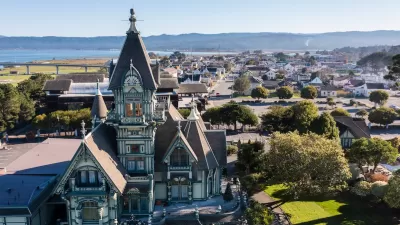In a region where most people “age in place,” facilities offering services and socialization give primary caregivers a much-needed break.
As America ages, and older Americans are increasingly uninterested in (or unable to afford) the traditional nursing home, more and more Americans are trying to understand how to make “aging in place” a viable alternative.
In the Rio Grande Valley, one incongruously popular solution is “adult day care.”
In a piece for the Texas Observer, Daniel Blue Tyx reports that there are twice as many of these facilities in the handful of counties that comprise the Valley than there are in Houston, Dallas, and Austin—combined.
"There’s a running joke in the Valley that you can find an adult day care on every street corner," Tyx writes, a phenomenon he calls "part culture, part economic."
The Rio Grande Valley does not have a particularly large share of seniors, but it does have a "persistently high poverty rate" and a population that is 90 percent Hispanic and “more likely than Anglos to live at home with their children or other family members.”
“Adult day cares like those in the Valley can offer a kind of middle way between round-the-clock care by family caregivers — who frequently burn out and experience physical and mental problems themselves — and expensive, sometimes impersonal nursing home care.”
The centers Tyx profiles provide everything from exercise programs to shopping trips to social opportunities, and for the most part, it’s paid for by Medicare.
"Nationally, the number of adult day care participants has increased 63 percent since 2002, even as nursing home occupancy has flatlined. If this trend continues, the Valley today may offer a glimpse at what health care for older Americans will look like in the future."
FULL STORY: The Day Shift

Alabama: Trump Terminates Settlements for Black Communities Harmed By Raw Sewage
Trump deemed the landmark civil rights agreement “illegal DEI and environmental justice policy.”

Study: Maui’s Plan to Convert Vacation Rentals to Long-Term Housing Could Cause Nearly $1 Billion Economic Loss
The plan would reduce visitor accommodation by 25% resulting in 1,900 jobs lost.

Planetizen Federal Action Tracker
A weekly monitor of how Trump’s orders and actions are impacting planners and planning in America.

Wind Energy on the Rise Despite Federal Policy Reversal
The Trump administration is revoking federal support for renewable energy, but demand for new projects continues unabated.

Passengers Flock to Caltrain After Electrification
The new electric trains are running faster and more reliably, leading to strong ridership growth on the Bay Area rail system.

Texas Churches Rally Behind ‘Yes in God’s Back Yard’ Legislation
Religious leaders want the state to reduce zoning regulations to streamline leasing church-owned land to housing developers.
Urban Design for Planners 1: Software Tools
This six-course series explores essential urban design concepts using open source software and equips planners with the tools they need to participate fully in the urban design process.
Planning for Universal Design
Learn the tools for implementing Universal Design in planning regulations.
Caltrans
Smith Gee Studio
Institute for Housing and Urban Development Studies (IHS)
City of Grandview
Harvard GSD Executive Education
Toledo-Lucas County Plan Commissions
Salt Lake City
NYU Wagner Graduate School of Public Service





























